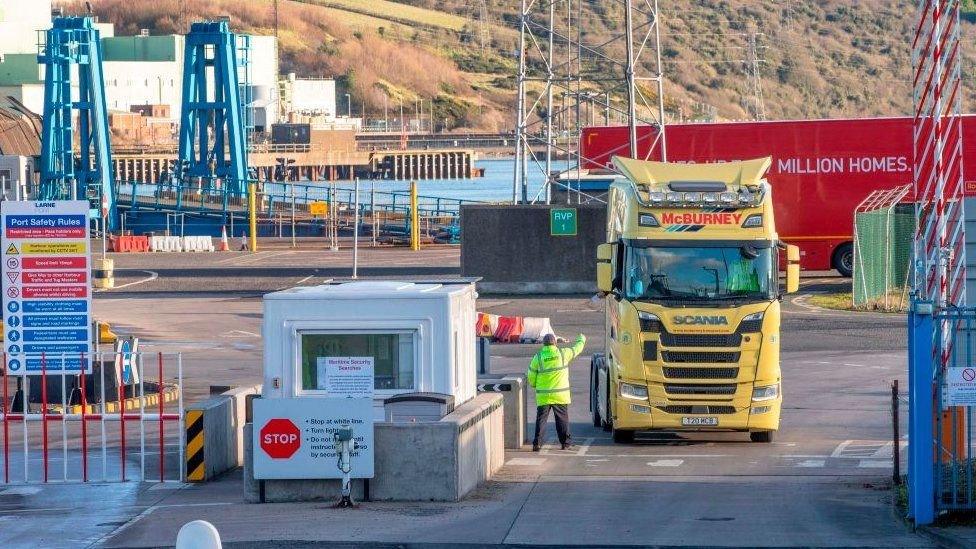Brexit: NI Protocol like Vichy regime, court is told
- Published

The legal action argues the protocol is a breach of the Good Friday Agreement and the Act of Union
The operation of the Northern Ireland Protocol has been likened to the Vichy regime, during a legal challenge at the High Court in Belfast.
Vichy was the collaborationist French administration during Nazi occupation.
John Larkin QC made the analogy in his opening argument on behalf of unionists politicians.
He was referring to the part of the protocol which says UK officials should carry out border controls when asked to by the EU.
The protocol is the part of the Brexit deal which creates a trade border between Northern Ireland and Great Britain.
Article 12 of the protocol describes how it should be it be applied and enforced.
One part of that article says: "Where the Union (EU) representative requests the authorities of the UK to carry out control measures in individual cases for duly stated reasons, the authorities of the UK shall carry out those control measures."
It is this section that Mr Larkin likened to Vichy France.
Unionist leaders who have taken the case say that the protocol is unlawful because it breaches the Acts of Union and the 1998 Good Friday Agreement.
Much of Mr Larkin's opening argument focused on the Acts of Union which created the United Kingdom of Great Britain and Ireland in 1800.
He focused on Article 6 which formed a customs union between Britain and Ireland.
'Deceptive mockery'
He said the protocol breaches that by leaving Northern Ireland inside the EU's customs union.
He read from an affidavit from outgoing Democratic Unionist Party (DUP) leader Arlene Foster which stated: "The government had no power to make any agreement that treats the Acts of Union as if they don't exist."
Mr Larkin gave a close reading of the parts of the Northern Ireland Protocol which deal with trade, taxation and state aid.
He said that although the protocol states that "Northern Ireland is part of the customs territory of the UK," this is not the case in practice.
"Despite the headline in Article 4 it is abundantly clear that Northern Ireland is in the EU custom's union," he told the court.
To support this, he referred to Article 5 of the protocol which states Article 30 on Treaty on the Functioning of the European Union (TFEU) applies in Northern Ireland.
Article 30 TFEU is the legal underpinning of the EU customs union.
Mr Larkin said Article 4 of the protocol is a "deceptive mockery" while Article 5 is the "real machinery".
The Northern Ireland Act
Later Mr Larkin focused on the impact of the protocol on the Northern Ireland Act.
It is the piece of legislation which puts the Good Friday Agreement into domestic law and is sometimes seen as Northern Ireland's constitution.
Mr Larkin looked first at section one of the act which states that "Northern Ireland in its entirety remains part of the UK" unless a majority of people vote otherwise in a referendum.
He gave an expansive interpretation of that section, saying it concerns more than the "final removal of the last vestige of sovereignty".
He said the protocol involves a transfer of legislative power to Brussels which amounts to a fundamental change of status and therefore conflicts with the Northern Ireland Act.
He said: "If the power to make law for Northern Ireland can be given to Brussels it can be given just as legally to the Oireachtas (Irish Parliament)."
He then looked at Section 42 of the Northern Ireland Act which concerns cross community consent in the NI Assembly.
The protocol will be subject to a consent vote every four years but only by straight majority rather on a cross community basis.
Mr Larkin said: "You do not comply with the terms of the Northern Ireland Act by changing the terms of the Northern Ireland Act."
The case, being heard by Mr Justice Colton, is scheduled to last for up to four days.
Reserved judgement is expected to be delivered in the next few months.
That judgement is likely to be appealed and the case could ultimately be heard by the Supreme Court before the end of this year.
The case will resume on Monday.
- Published11 May 2021

- Published2 February 2024

- Published7 May 2021
